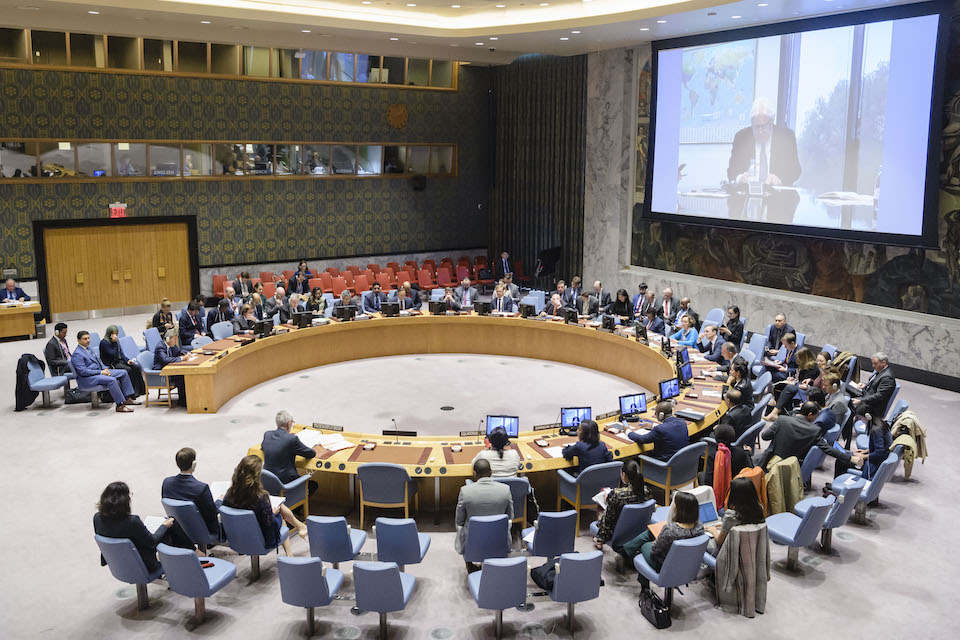Small signs of progress in Yemen
Statement by Ambassador Karen Pierce, UK Permanent Representative to the UN, at the Security Council briefing on the situation in the Middle East (Yemen).

Thank you very much, Mr President. Thank you to our two briefers and again, through them, thank you to all the work that their teams are doing on the ground.
I think we’ve heard a very wide ranging description of what’s going on on the ground at the moment with some very good parts, as Martin said, but also some things we need to watch very carefully. And I’ll come back to both of those if I may.
I wanted to begin by expressing support for where we’ve got to on the political process. Martin’s plan to move forward with political consultations in parallel to ongoing implementation of Stockholm is very welcome and we obviously support doing that as quickly as possible. We welcome General Guha and we’ll have a chance to hear from him in consultations, but in the meantime, the reduction in violations of Stockholm is very welcome.
For the United Kingdom, Mr President, we were also pleased that at UNGA High Level Week, we were able to have meetings with a number of colleagues and with Martin to support his efforts and we still have the August Council presidential statement so I think this really is a time, as we’ve heard from both Mark and Martin, for one last big effort to get some of these things over the line.
Staying with the humanitarian situation, I think Mark’s absolutely right to remind us that despite the good news – and I agree that the fuel ships is very good news – we still have some underlying points that could tip the situation back towards famine or some other risks. Thirteen people dying a day is clearly too many and it’s it’s degrading the whole situation on the ground. I hear what he says about the need for foreign exchange and also what all these factors, including the provision of fuel, mean in terms of their knock-on effect on the ability of the people of Yemen to have access to food and I think there is a vicious circle here that we need to watch out for.
Turning to the political side, Mr President, we have been very worried about the increased intensity of the Houthi attacks on Saudi Arabia over recent months. But the announcement on 20 September that the Houthis would cease strikes on Saudi Arabia and the welcoming remarks made by the kingdom of Saudi Arabia have been an important step towards de-escalation and we now hope that more positive action can happen on the ground. What Martin has been saying about signs of hope, I think we all want that those to crystallize and develop. And again, you know, it’s clear that we’re close to an agreement, we’re not quite there. I think from the Security Council, we should appeal to all parties to give this one last push to get it across the line. I think that’s really important and we can talk more about that.
I think in terms of the south, inclusivity is the key to stability. We want a deal that brings southern representatives into the Yemeni government and that in turn will be hopefully a self-sustaining, virtuous circle. We commend the Saudis and others for the talks that have taken place and the Yemeni government for all its work with the Southern Transitional Council. What Martin said about the unilateral release of detainees on 30 September by the Houthis obviously is positive and I’m very pleased to see that the International Committee of the Red Cross Red Crescent is taking part in that. We hope there will be more such measures as we work towards a peaceful solution to the conflict in Yemen.
I wanted, if I may, Mr. President, just to draw attention to two specific points. One is about the safer oil tanker, as Mark has made very clear several times in this chamber. A rupture or explosion would mean over a million barrels of oil leaking into the Red Sea. Now this is critical to do something about this in order to protect the fisheries and livelihoods of ordinary Yemenis, as well as the environmental impact.
We need more efforts on humanitarian access. This is deteriorating across the country, as Mark said. So we call on all parties to immediately comply with SCR 2451. There’s something about funding disbursements; it was very welcome what happened in High Level Week. We commend the governments of Saudi Arabia, the United Arab Emirates and Kuwait very generous disbursements, which I think in total came to around $800 million, which is very significant and demonstrates real international leadership, so our thanks to those countries. But we note that the response still remains $1.5 billion underfunded, so we would encourage all donors to consider providing further funding to the UN appeal. For the United Kingdom, we have brought forward funding from our nearly $300 million pledge and we have provided 87 percent of the funding we pledged to UN agencies this year.
My last point, if I may, Mr President: I wanted to raise the case of the Baha’i. The Baha’is have been persecuted for their religious beliefs in those areas under the control of the Houthis and I think this is something – we condemn the mistreatment, but I think the continued persecution of the Baha’is is something we need to keep an eye on from this Council.
Thank you very much.